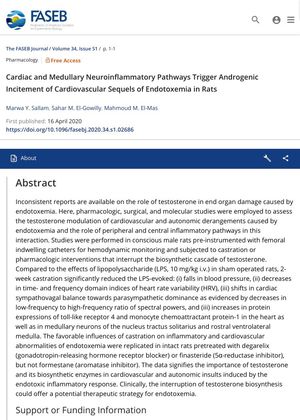Cardiac and Medullary Neuroinflammatory Pathways Trigger Androgenic Incitement of Cardiovascular Sequels of Endotoxemia in Rats
April 2020
in “
The FASEB Journal
”

TLDR Testosterone increases heart and blood pressure issues in rats with endotoxemia, and stopping testosterone production can reduce these problems.
The study, conducted on male rats, investigated the role of testosterone in end organ damage caused by endotoxemia, a condition characterized by the presence of endotoxins in the blood. The researchers used pharmacologic, surgical, and molecular studies to assess how testosterone modulates cardiovascular and autonomic derangements caused by endotoxemia. The study found that castration, or the removal of testosterone, significantly reduced the negative effects of lipopolysaccharide (LPS), a component of endotoxins, on blood pressure, heart rate variability, cardiac sympathovagal balance, and protein expressions in the heart and medullary neurons. These beneficial effects were also observed in rats pretreated with degarelix or finasteride, which interrupt testosterone biosynthesis, but not with formestane. The findings suggest that testosterone and its biosynthetic enzymes play a significant role in cardiovascular and autonomic issues induced by endotoxic inflammatory response, and that interrupting testosterone biosynthesis could potentially be a therapeutic strategy for endotoxemia.




